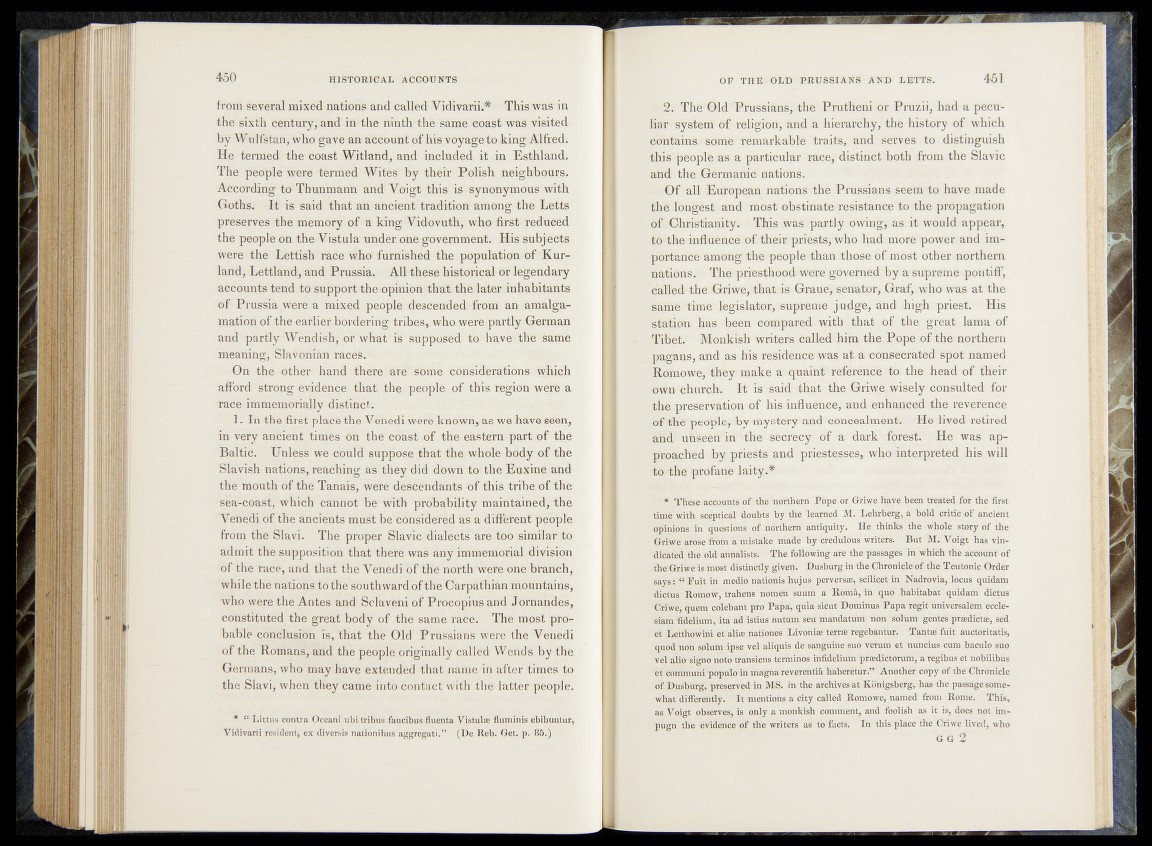
f rom several mixed nations and called Vidivarii.* This was in
the'sixth century, and id-the ninth thé same ’coast was visited
by Wulfstan, who gave an account of his'voyage to king Alfred-.
He termed the coast Witland, and included it in Esfchland.
The people were termed' Witès- by their Polish neighbours.
According to Thunmann and Voigt this, is- Synonymous with
Goths. I t is-said that an ancient tradition among the Letts
preserves the memory of a king Vidovuth, who first reduced
the people on the Vistula under one government. His subjects
were the Lettish race who furnished the population of‘ Kurland,
Lettlandj and Prussia. All thëse historical or legendary
accounts tend to support the opinion th a t the later dnh abitants
off Prussia ;were a mixed people: descended from an amalgamation
of the earlier bovdëriag: tribes, whceweieipartly German
and partly Wendishy or what is4 suppoiëd? to havel'the same
meaning, Slavonian races.
On the other hand there^afe' ^öihë 'cllh^dhr^ous« which
afford strong evidence that the jfepplesofi thtis r^ifon wer^a
race immemorially distinct.
1. In the first place the Venedi were known, as we have seen,
in very ancient times, on thé coast of thefehsterh part the
Baltic.^ Unless We could suppose that the^whdfefM^t of the
Slavish nahmis, reaching as^they did down to! the Euxine .and
the mouth of the Tanais, wereAëséendants (of this tri'bexJfMrhfe
sea-cOast, which cannot be with probability maintained,'thé
Venedi of the ancients must bë C'óhsidered as a different people
from the Slavi. The proper Slavic dialects are too similar to
admit'the supposition that there was any immemorial division
of the race, and that theVenedidffhe ttótdh'%efefönébranch,
while the nations to the south ward of thé Carpathian mountains,
who were the Antes and Sclaveni of Procopius and Jornandes,
constituted the gfëaf bódy of the same race. The most probable
conclusion is, that the Old Prussians were the Vehedi
of the Romans, and the people originally CÓlléd Wends by the
Germans, who may have extended that’name in aftetf times to
the Slavi, when they came into contact'with.the latter people.
* “ -Littus contra Oceani ubi tribus faucibus fluenta Vistula fluminis ebibuntur,
Vidivarii resident, ex diversis nationibus aggregati.” (De Reb. Get. p. 85.)
The' Old Prussians, the. Prutheni or Pruzii, had a peculia
r ly s-teri? off religion, and a hierarchy, the history of which
contains.?some remarkable1' traits/»dnd serves to distinguish
this jSd'ople .as.a, particular race, distinct both from the Slavic
and the Germanic nations. -
; Of all European nationsSthe Prussians- seern to have made
theblongest and most- obstinatei,resistance ito tho propagation
©LiGhristiamby^ This was ^partly owing, as it would appear,
torthe influence of their priests, who had more power and im-
Moirtance among the -people than those of most other northern
nations. The' pxaesthoodfWtejKejgovefned by a supreme pontiff,
'cblled th&Griwe,that is Graueysenator, Graf, who was at the
same time*. legislator^ supreme judgbj and high priest:- His
^fea^ion'has-^een-compared with that .of the-great lama of
Tibet. Monkish writers called him- tbe^Pope of the northern
pagans, and as his-residence was at a consecrated spot named
Rombweytheyimake aquai'ri^ref4rence to the head of their
CbWn tebtirch. It idogai^’ -that the Griwe wisely consulted for
-the preservation of his influence," and,enhanced the reverence
Of th‘e?**p^6'ple, by mystery and *coiac'ea%nent.- He lived retired
'and the' s i& e ty of a dark forest. He was approached
hyjpiiests and p r i e ^ s ^ s ,;who interpreted his will
t-@Hhe ptofan’e laity.*
*! These-acGpptjts of the hiorthein Pope or Gi-rwe havé been treated for ïhëgést
time With sceptical doubts by the learned M. Iiehtbcrg, a bold cifitic of ancient
fö|hhióÈs in questions of, northern anrapiityl He'thinks--the whole story of the
'Griwe aio'Se’êóm #ihiStäke made by credulous writers. 'But M. Voigt hasvm-
'dlb^e'd the old annalists. The following afë the passagès in which the account of
the Griwe is most dikirictly given. Dusburg in the Chronicle of the Teutonic Order
sayii ?{T u it in medio patioiiis hujus perfërsas^'scilicetin Nadrovia, locus quidam
metis Romow, trahenfe nomen smith ä Romh, in ijuó' nabitabat quidam dictus
quëm cólèbant pro Papa, q-uiasiéut DorbiiiiUs Papa regit univérsalem eccle-
siaïn fedélium, ita ad IMus nutum seu manäatuim non solum gentes predict®, sed
et Letthowini et alise nationes Livoni® terra regebantur. Tantae fuit auctoritatis,
quod non Mum ipse vél ali‘qüis de'sanguine suö' verum et ntincius bum baculo suo
VeTäliö sigüo rioto transiens terminös lnfidelaüm'‘prEedictórum, a regibus et nobilibüs
' ë f cóöïmuni Jopulo in magna fevereütik haberetur.” Ähother copy of the Chronicle
of Dusburg, preserved in MS. in the archives at Königsberg, has the passage somewhat
differently. I t ^mentions a cify called Romowe, named from Rome. This,
as. Voigt observes, is only a monkish comment, and foolish as it is, does not impugn
the evidence of the writers as to facts. In this i»lace the Griwè lived, who
Ö G 2^ ‘